

Writing and Publishing posts and links. A list of some of the posts about writing and publishing from this blog.
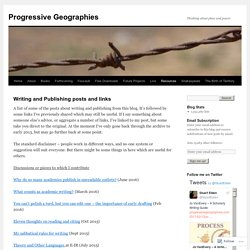
Library - Jo VanEvery. Library - Jo VanEvery. A researcher’s survival guide to information overload and curation tools. Between constant email access through your smart phone and twitter conversations that pay no heed to boundaries of time or location, it’s easy to get lost in an online information overload.
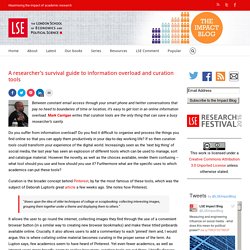
Mark Carrigan writes that curation tools are the only thing that can save a busy researcher’s sanity. Do you suffer from information overload? Do you find it difficult to organise and process the things you find online so that you can apply them productively in your day-to-day working life? If so then curation tools could transform your experience of the digital world. Increasingly seen as the ‘next big thing’ of social media, the last year has seen an explosion of different tools which can be used to manage, sort and catalogue material. Curation is the broader concept behind Pinterest, by far the most famous of these tools, which was the subject of Deborah Lupton’s great article a few weeks ago. A sociologist’s adventures in social media land. Deborah Lupton was pleasantly surprised when her first step into online academic discussions was met with over 2,000 readers and many instructive comments.
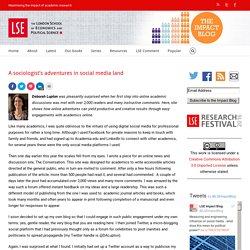
Here, she shows how online adventures can yield productive and creative results through easy engagements with academics online. Like many academics, I was quite oblivious to the virtues of using digital social media for professional purposes for rather a long time. Although I used Facebook for private reasons to keep in touch with family and friends, and had signed up to Academia.edu and LinkedIn to connect with other academics, for several years these were the only social media platforms I used. Then one day earlier this year the scales fell from my eyes.
I wrote a piece for an online news and discussion site, The Conversation. I soon decided to set up my own blog so that I could engage in such public engagement under my own terms: yes, gentle reader, the very blog that you are reading here. 30 tips for successful academic research and writing.
What do words want? Academics have a responsibility to send words well equipped into the world. Struggling with the familiar sensation of fear when preparing to send a paper to publishers?
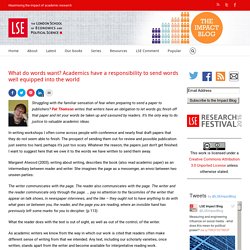
Pat Thomson writes that writers have an obligation to let words go; finish off that paper and let your words be taken up and savoured by readers. It’s the only way to do justice to valuable academic ideas. In writing workshops I often come across people with conference and nearly final draft papers that they do not seem able to finish. The prospect of sending them out for review and possible publication just seems too hard, perhaps it’s just too scary. Whatever the reason, the papers just don’t get finished. Margaret Atwood (2003), writing about writing, describes the book (also read academic paper) as an intermediary between reader and writer.
Your essential ‘how-to’ guide to writing good abstracts. Article abstracts typically say little about what the researcher has discovered or what the key findings are, what they are arguing as a ‘bottom line’, or what key ‘take-away points’ they want readers to remember.
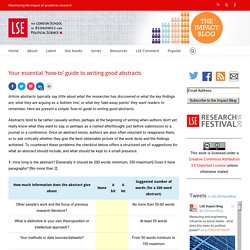
Here we present a simple ‘how-to’ guide to writing good abstracts. Abstracts tend to be rather casually written, perhaps at the beginning of writing when authors don’t yet really know what they want to say, or perhaps as a rushed afterthought just before submission to a journal or a conference. Once an abstract exists, authors are also often reluctant to reappraise them, or to ask critically whether they give the best obtainable picture of the work done and the findings achieved. To counteract these problems the checklist below offers a structured set of suggestions for what an abstract should include, and what should be kept to a small presence. 1. 2. 3.
Teaching Writing with 5-Minute Workshops - Teaching TSP. Most sociology teachers want to teach writing.
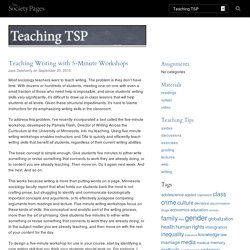
The problem is they don’t have time. With dozens or hundreds of students, meeting one-on-one with even a small fraction of those who need help is impossible, and since students’ writing skills vary significantly, it’s difficult to draw up in-class lessons that will help students at all levels. Given these structural impediments, it’s hard to blame instructors for de-emphasizing writing skills in the classroom. To address this problem, I’ve recently incorporated a tool called the five-minute workshop, developed by Pamela Flash, Director of Writing Across the Curriculum at the University of Minnesota, into my teaching. Timeshighereducation. Good writers are often fooled by the lure of plain English.
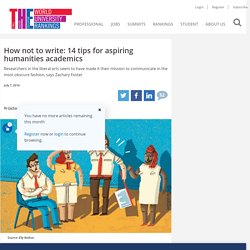
Most academics in the humanities are not duped so easily, though. They understand the power of jargon, obscurity and incoherence. Those aspiring to follow in their footsteps would do well to consider the following tips and tricks. Titles. Once upon a time, scholars thought titles should be succinct and descriptive. Invented words. Between, beyond and towards. Shudder quotes. Strategies to Maintain Focus while Writing Your Dissertation. Danielle Marias is a Ph.D. candidate in Forest Ecosystems and Society at Oregon State University.
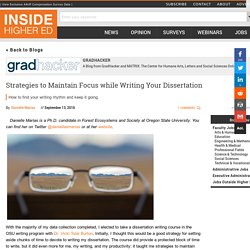
You can find her on Twitter @danielleemarias or at her website. With the majority of my data collection completed, I elected to take a dissertation writing course in the OSU writing program with Dr. Vicki Tolar Burton. Initially, I thought this would be a good strategy for setting aside chunks of time to devote to writing my dissertation. The course did provide a protected block of time to write, but it did even more for me, my writing, and my productivity: it taught me strategies to maintain focus. Today, the internet and Google and social media are flashier and more distracting than ever before. Five ways to structure a literature review. Showing, not telling: some thoughts on social science and (science) fiction. In the eleventh part of our special section on Sociology and Fiction, Paul Graham Raven reflects on the resources offered by fiction for the communication of sociological ideas to diverse audiences.
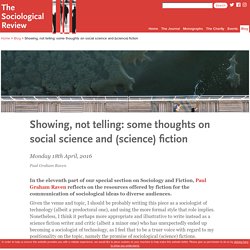
Literature work in a journal article – the introduction. I was recently asked how much literature should go in the introduction of a journal article and how much should go in a separate literature section.
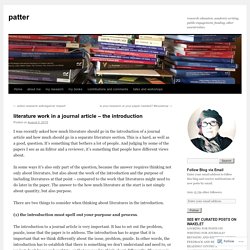
This is a hard, as well as a good, question. It’s something that bothers a lot of people. And judging by some of the papers I see as an Editor and a reviewer, it’s something that people have different views about. In some ways it’s also only part of the question, because the answer requires thinking not only about literature, but also about the work of the introduction and the purpose of including literatures at that point – compared to the work that literatures might need to do later in the paper. Are you experienced (at writing journal articles) So you’ve not written a lot of journal articles before, if any.
Does this matter? Well not necessarily – but it might. When asked, journal editors almost always report that one of the major reasons for paper rejections is that their writers sound like ‘newbies’. Something about the writing itself gives away the fact that the authors aren’t experienced. Writing a journal article? start with the So What question. I’m running another writing course soon in Iceland and have been sorting through potential pre-reading material. In my file of pdfs I came across an editorial written by Neil Selwyn in the journal Learning, Media and Technology. The piece is called ‘So What?’ … a question every journal article needs to answer‘. An Error Occurred Setting Your User Cookie. Untitled. Concluding the journal article.
The conclusion to a journal article is very important. Structuring research articles. Research as an argument. Writing warm-ups. One of my current research projects looks at the ways in which young people value the experience of live art. 70 useful sentences for academic writing. Back in the late 90s, in the process of reading for my MA dissertation, I put together a collection of hundreds of sentence frames that I felt could help me with my academic writing later on. Cohesion: linking words and phrases. 1.33 Cohesion: linking words and phrases You can use words or short phrases which help to guide your reader through your writing, and to link sentences, paragraphs and sections both forwards and backwards. EAP Vocabulary. Academic Word List Coxhead (2000).
Critical Appraisal and Analysis - Critically Analyzing Information Sources. A. Author. Get a free logical fallacy poster. Five ways to structure a literature review.